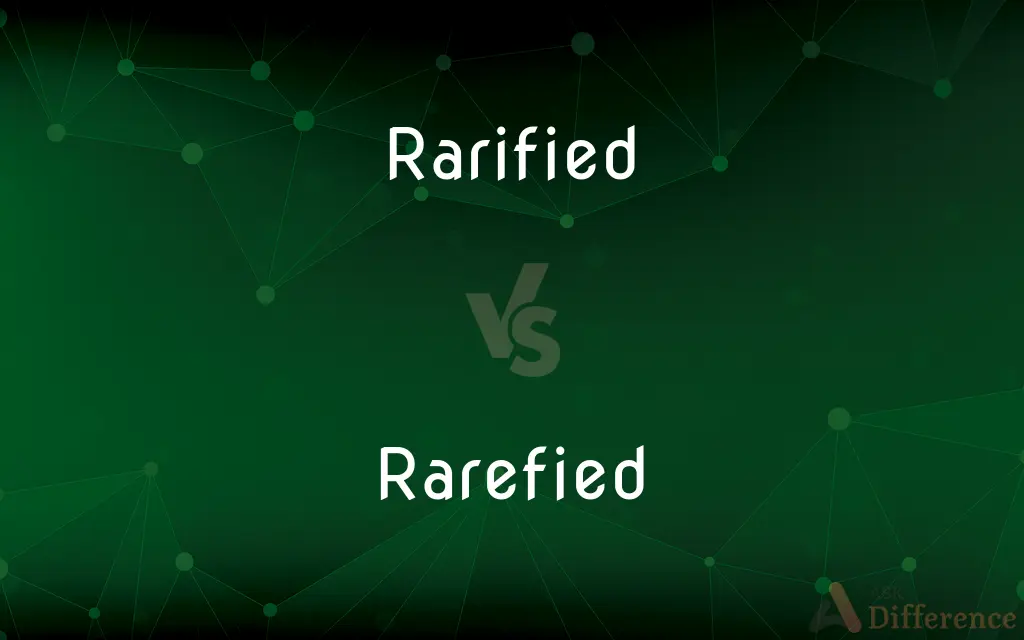Rarified vs. Rarefied — What's the Difference?
By Tayyaba Rehman & Fiza Rafique — Updated on March 25, 2024
Rarified and rarefied both imply making less dense, but "rarified" often refers to air or gas, whereas "rarefied" is used more broadly, including abstract concepts.

Difference Between Rarified and Rarefied
Table of Contents
ADVERTISEMENT
Key Differences
Rarified is commonly used to describe air or gas that has decreased in density, often due to a reduction in pressure or an increase in altitude. This term is especially prevalent in scientific and technical contexts, where precision is crucial. On the other hand, rarefied can extend beyond physical descriptions to encompass situations, conditions, or realms that are elevated, esoteric, or exclusive in nature, making it versatile in both literal and metaphorical applications.
While rarified has a specific application to the physical state of substances, highlighting its scientific and technical usage, rarefied can denote refinement or exclusiveness in social or intellectual contexts. For instance, one might talk about rarified air at high altitudes where oxygen levels are low, whereas discussions on rarefied art could refer to works that are appreciated by a select few due to their sophistication or complexity.
The term rarified emphasizes the physical transformation or condition that results from a decrease in density. It is particularly relevant in discussions about environmental conditions, such as those encountered in mountainous or high-altitude regions. Rarefied, however, often appears in discussions about culture, ideas, or social settings, emphasizing exclusivity or a high degree of sophistication.
Rarified can be directly related to tangible changes in the environment or materials, making it a term with clear, measurable implications. In contrast, rarefied can imply a degree of subjectivity, as what constitutes a rarefied atmosphere in art, music, or social interaction may vary widely among individuals or groups, reflecting personal tastes or societal norms.
The distinction between rarified and rarefied also mirrors the difference between a narrow, specialized application and a broader, more inclusive usage. While rarified remains anchored in the physical sciences, rarefied's flexibility allows it to traverse a wider range of topics, from the arts and philosophy to social commentary, illustrating its adaptability to different discourses.
ADVERTISEMENT
Comparison Chart
Definition
Refers to air or gas that is less dense, typically due to altitude or pressure changes.
Used to describe things that are elevated, esoteric, or exclusive, beyond just air or gas.
Usage Context
Scientific and technical fields.
Broad, including abstract concepts, social settings, and intellectual discussions.
Connotations
Primarily physical and environmental.
Can be physical, but often metaphorical, implying exclusivity or sophistication.
Examples
"Rarified atmosphere at high altitudes affects breathing."
"Rarefied circles of intellectual debate."
Related to
Physical state changes.
State of exclusivity or refinement.
Compare with Definitions
Rarified
Related to scientific study.
The study focused on the effects of rarified oxygen levels on human physiology.
Rarefied
Pertaining to refinement in taste or intellect.
His rarefied taste in literature set him apart from his peers.
Rarified
Reduced in density.
The mountaineers prepared for the rarified atmosphere at higher elevations.
Rarefied
Related to abstract or metaphysical concepts.
The philosopher’s work explored rarefied concepts of existence.
Rarified
Pertaining to a decrease in air density.
Aircraft designs must consider the rarified air in their performance metrics.
Rarefied
Elevated or esoteric.
The gallery showcased rarefied art pieces that appealed to a niche audience.
Rarified
Specific to physical environments.
Rarified gases in laboratory experiments simulate high-altitude conditions.
Rarefied
Broadly applicable beyond the physical.
The discussion ventured into rarefied theories of quantum mechanics.
Rarified
Concerned with tangible changes.
Engineers test vehicle engines in rarified conditions to simulate driving at altitude.
Rarefied
Exclusive or sophisticated.
She moved in rarefied social circles that included top intellectuals and artists.
Rarified
Variant of rarefied.
Rarefied
Not dense; thin
The rarefied air of the high peaks.
Rarified
Alternative spelling of rarefied
Rarefied
Belonging to or reserved for a small select group; exclusive
Accepted in the most rarefied social circles.
Rarified
Simple past tense and past participle of rarify
Rarefied
Refined or esoteric
Rarefied academic theorizing.
A man of rarefied appetites.
Rarified
Having low density;
Rare gasses
Lightheaded from the rarefied mountain air
Rarefied
Distant from the lives and everyday concerns of ordinary people; esoteric, exclusive, select.
Philosophical debates can be quite rarefied.
Rarified
Reserved for an elite group
Rarefied
Elevated in style or nature, sublime; of high intellectual or moral value.
Rarified
Of high moral or intellectual value; elevated in nature or style;
An exalted ideal
Argue in terms of high-flown ideals
A noble and lofty concept
Rarefied
(of a gas etc.) Less dense than usual; thin.
The air at high altitudes at the top of mountains is rarefied.
Rarefied
Simple past tense and past participle of rarefy
Rarefied
Having low density;
Rare gasses
Lightheaded from the rarefied mountain air
Rarefied
Reserved for an elite group
Rarefied
Of high moral or intellectual value; elevated in nature or style;
An exalted ideal
Argue in terms of high-flown ideals
A noble and lofty concept
Common Curiosities
Can rarified be used metaphorically?
While typically used in a literal sense for air or gas, rarified can metaphorically describe things that are thinned or diluted.
What are common contexts for using rarified?
Rarified is commonly used in scientific, technical, and environmental contexts.
Is rarefied only related to social exclusivity?
No, rarefied can also refer to intellectual, artistic, or cultural aspects that are considered elevated or sophisticated.
How does altitude affect rarified air?
Altitude increases, air pressure decreases, making the air rarified or less dense.
What does rarified mean?
Rarified refers to air or gas that has decreased in density, often due to altitude or pressure changes.
How is rarefied used differently from rarified?
Rarefied is used more broadly to describe things that are elevated, esoteric, or exclusive, not just air or gas.
What makes something rarefied in the arts?
In the arts, something is considered rarefied if it requires a high degree of sophistication or exclusivity to appreciate.
Can the term rarified apply to music?
Yes, in a metaphorical sense, to describe music that might seem less accessible or denser to the general audience.
What is a rarefied atmosphere?
It can refer to either a physical condition of decreased air density or a metaphorical condition of exclusivity and sophistication.
Why is rarefied art considered challenging?
Because it often requires specialized knowledge or an acquired taste to fully appreciate its depth and nuances.
Can a person's tastes be described as rarified?
Typically, "rarefied" would be the appropriate term to describe highly sophisticated or exclusive tastes.
Is there a cultural aspect to rarefied?
Yes, rarefied often pertains to cultural elements that are regarded as exclusive, sophisticated, or of high intellectual value.
Do rarified and rarefied mean the same thing?
While they are closely related, their usage differs in context and scope, with rarified focusing more on physical states and rarefied on broader, often abstract concepts.
Can the environment be rarefied?
Yes, both in a literal sense of having less dense air and metaphorically, to describe an atmosphere of exclusivity or sophistication.
What kind of scientific research involves rarified conditions?
Research that investigates the effects of high altitude or low-pressure environments on various physical and biological systems.
Share Your Discovery

Previous Comparison
Pathophysiology vs. Etiology
Next Comparison
Operation vs. SurgeryAuthor Spotlight
Written by
Tayyaba RehmanTayyaba Rehman is a distinguished writer, currently serving as a primary contributor to askdifference.com. As a researcher in semantics and etymology, Tayyaba's passion for the complexity of languages and their distinctions has found a perfect home on the platform. Tayyaba delves into the intricacies of language, distinguishing between commonly confused words and phrases, thereby providing clarity for readers worldwide.
Co-written by
Fiza RafiqueFiza Rafique is a skilled content writer at AskDifference.com, where she meticulously refines and enhances written pieces. Drawing from her vast editorial expertise, Fiza ensures clarity, accuracy, and precision in every article. Passionate about language, she continually seeks to elevate the quality of content for readers worldwide.














































